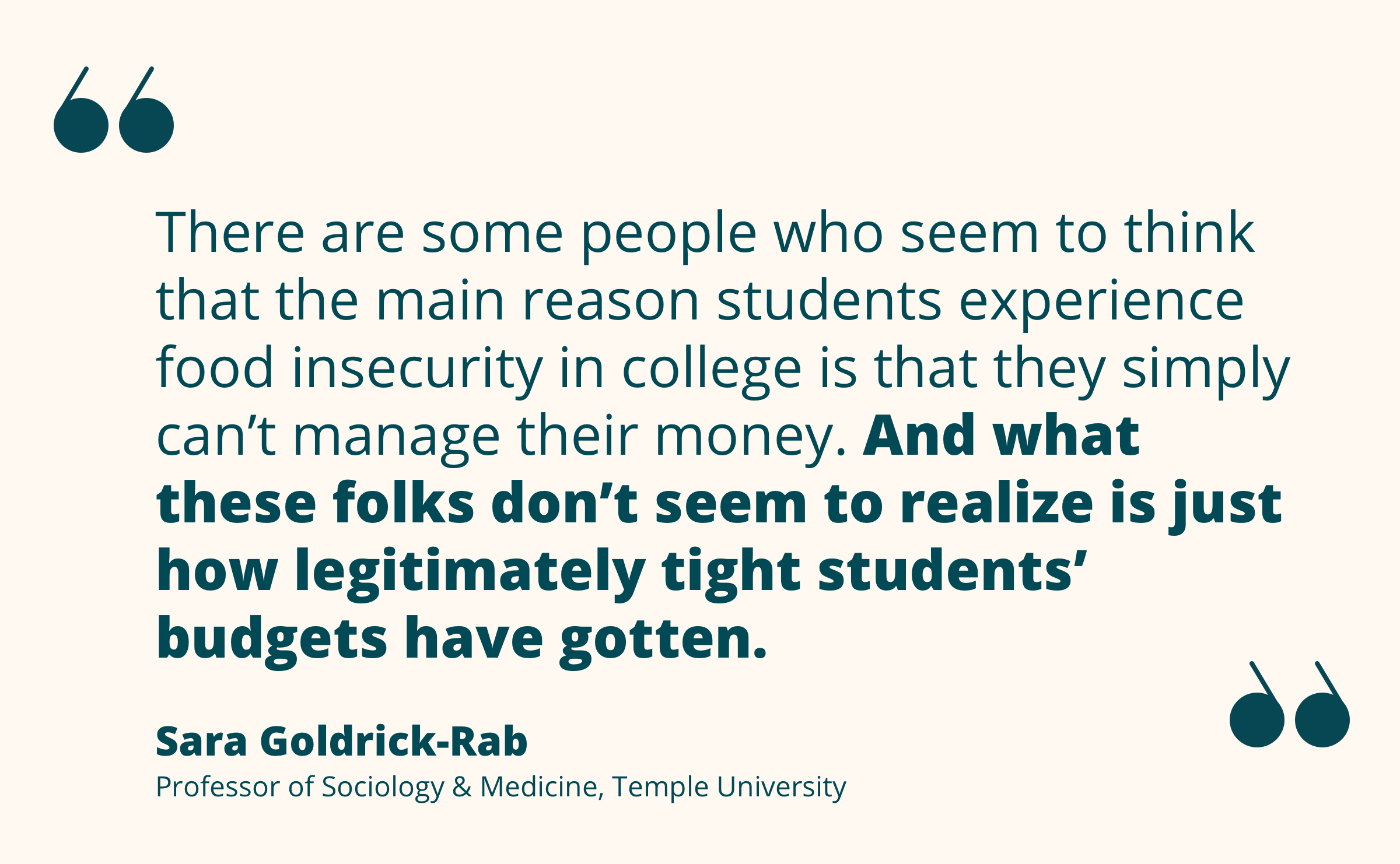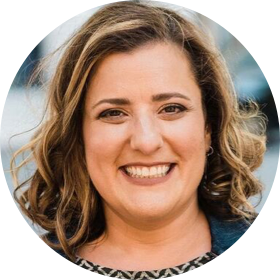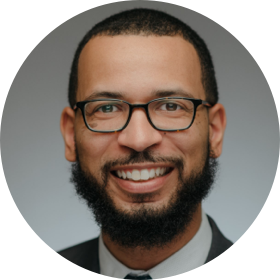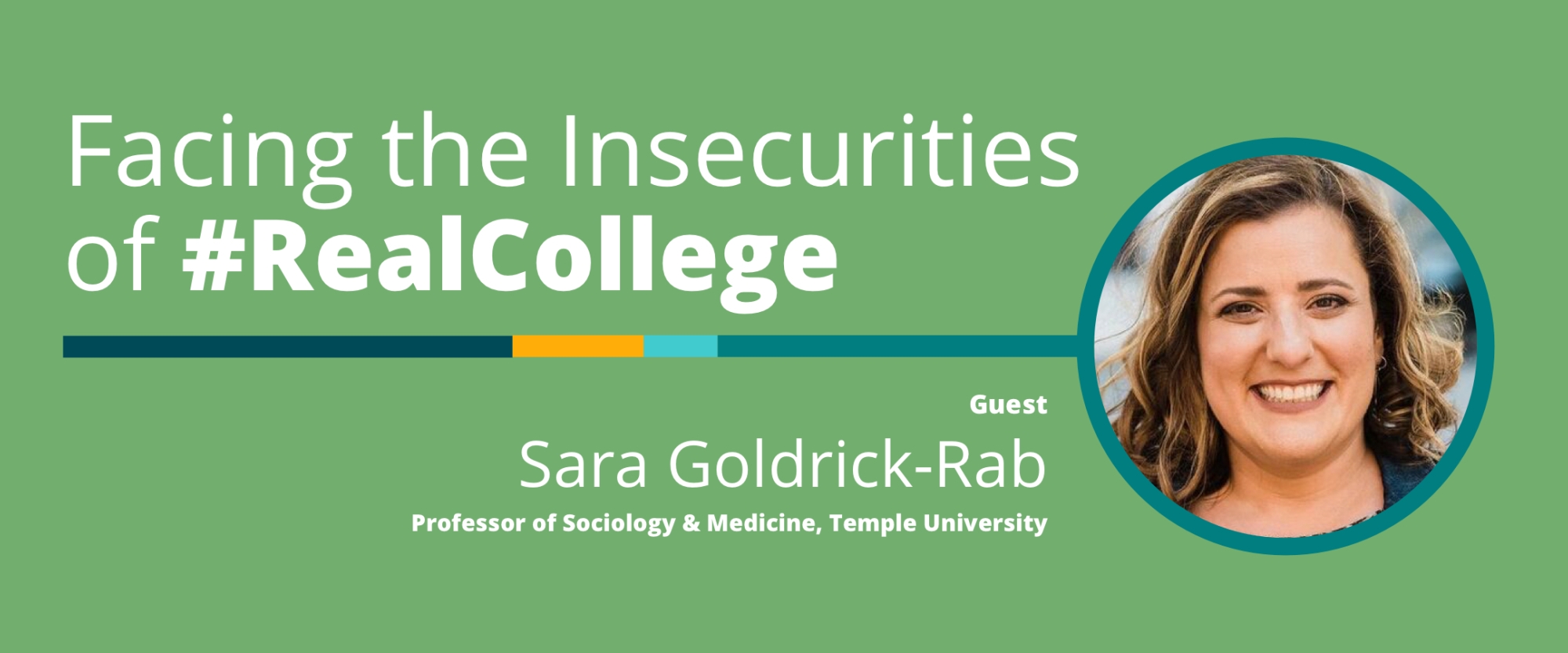Note: This interview in the Scholarship to Practice Series originally aired on November 18, 2020 as part of the University Innovation Alliance’s Innovating Together podcast, appearing live on Facebook, Twitter, and LinkedIn.
The University Innovation Alliance (UIA) proudly presents the Innovating Together Podcast in partnership with Inside Higher Ed. I'm the UIA's Executive Director, and for Innovating Together's Scholarship to Practice series, my co-host is Derrick Tillman-Kelly, Director of UIA's Fellows Program and Network Engagement. Scholarship to Practice highlights relevant research on topics that administrators need to hear about. For our 11/18/20 episode, we spoke with Dr. Sara Goldrick-Rab, professor of sociology and medicine at Temple University, president and founder of the nonprofit Hope Center for College, Community, and Justice, and originator of the #RealCollege movement. She talked to us about the prevalence of food and housing insecurity among the higher ed population, and how schools can address these realities.
The Many Faces of Insecurity
Professor Goldrick-Rab describes herself as a scientist studying the barriers that so often prevent students from completing college. "I’m not just interested in things like tuition," she explained. "I’m also really interested in their basic needs for things like food, housing, childcare, mental health support, and transportation – the kinds of things that really trip them up on the way to the degree."
One of her areas of focus is food insecurity. "What it means is that somebody does not have stable, regular access to enough food to eat," she said. "Food insecurity is a very serious issue. One of the reasons is that hunger affects the cognitive functioning that students have to do to be in school. There are some people who seem to think that the main reason students experience food insecurity in college is that they simply can’t manage their money. And what these folks don’t seem to realize is just how legitimately tight students’ budgets have gotten. We’re talking about students who are cutting the size of their meals, skipping meals, and sometimes even going without meals for as long as a day or more at a time because they simply don’t have money."

Professor Goldrick-Rab also looks at student homelessness, both the sheltered and the unsheltered. One form of housing insecurity is someone's struggle to meet expenses where they currently live. Another is living in an unsafe situation because they have nowhere else to go. "And housing insecurity is widespread among today’s college students," she pointed out. "That includes stuff like you do sleep on the street, you sleep in a tent, you sleep in your car, you stay at a homeless shelter, and it also includes couch surfing, which often means that you don’t have access to the full resources of the household. All of these forms of homelessness are associated with negative academic outcomes in college."
The Realities of #RealCollege
We asked Professor Goldrick-Rab about the term #RealCollege that we've been seeing in social spaces. She was happy to own it, recalling, "About ten years ago, we were just starting to share some data on food insecurity and such, and we faced resistance from people who said, 'That’s not happening, these are college students, they’re having fun and they’re academically adrift if anything.' And one night I was looking at all this data and reading emails from students and student affairs professionals who were telling me this is actually happening. And I said to myself, 'Enough already. Let’s stop pretending like this isn’t happening and address it.' I was a fan of The Real World, and so I started in with #RealCollege. December 4th is going to be our fifth anniversary of the inception of that movement. It’s about being honest that what college is now is really different than what you see on the television. And it’s not just different for low-income students, because the data show 75% of all American families and their students who are paying for college have to pay at least 20% of their income in order to afford a year of school – and I’m talking after financial aid. So I’d say that Real College is happening to most people."
Professor Goldrick-Rab's ongoing mission is to explain the realities of student hunger and homelessness to campus administrators and professionals. "Food pantries will not solve the problem," she stated. "It is the start of a response. It is not, however, an actual response. Sometimes the best thing you can do for somebody who needs food is not give them food; it’s to actually address their need for more income. We have to make sure that they can afford to get what they need. I think sometimes what’s hard about this is that the charitable response, where we just do a little philanthropy and we feel really good about it, has a seductive power. There’s a wonderful book called Sweet Charity? by Janet Poppendieck that describes how that seductive power of charity can deter us and dissuade us from the really hard work of policy change we need so that no student goes hungry when they’re trying to get a college degree."
Real-World Responses
Professor Goldrick-Rab offered a roadmap for any administrator willing to address food and housing insecurity head-on. "You need to get a couple of things in place immediately," she began. "The first thing is an effective emergency aid program. I’m talking about a well-advertised, constantly-advertised, emergency aid program that students can actually apply to online from the privacy of their own space 24/7, because emergencies happen around the clock. They should be asked questions that assess their material conditions, not their deservingness, not their value of the world, and frankly, not their grades. The issue is whether they’re facing a challenge that could cause them to leave school, and they shouldn’t be asked to perform their poverty in order to get support. They just need to tell you what it is they need. And you need to find a way with whatever you have at your disposal to try to meet that need as quickly as possible, within 48 hours. Part of the need is for someone to acknowledge their crisis, and even to just point them towards community resources can be helpful.
"In some cases, technology can be helpful," she continued. "I will note that the company I work with, called Edquity, is using my research to deploy emergency assistance very rapidly to students online all over the country. So I’d say emergency aid is a critical starting point. And beyond that, you need to connect them to government public benefit programs. We know that when the pandemic unemployment insurance was available, it was grossly underutilized by our students. That was money left on the table. SNAP is available to many students who aren’t using it. In 2021, I think we’ll see progress in terms of opening up that program to more college students. But they won’t get access to it if you don’t tell them about it. So every time you think about telling a student about the facts, please ask yourself, 'Have I also told them about every other income support program that’s available?'"
Showing and Seeing a Human Face
Professor Goldrick-Rab believes that conveying care is at the heart of any successful initiative to combat these insecurities. "We talk a lot in the Real College movement about the belief that students are humans first," she told us. "And we can advocate in lots of ways, including in our own practice, for their basic humanity. It is so worth stopping and asking a student how they are before you ask them whether they’ve chosen their courses. You will hear, in that moment, the issues that they’re actually facing. Why choosing their courses might not be the first thing on their minds. It might help to first know whether their basic needs are being met, because if they’re not and they’re pushed to take five courses, guess what? They’re not going to succeed in five courses."
Links Mentioned in This Episode
• Temple University
• Hope Center for College, Community, and Justice
• #RealCollege (initiative supporting all students' basic human needs)
• The Real World (MTV's popular reality series that premiered in 1992)
• Sweet Charity? Emergency Food and the End of Entitlement by Janet Poppendieck
• Edquity (emergency aid technology platform for college students)
• SNAP (the federally funded Supplemental Nutrition Assistance Program)
Keeping Up With Dr. Sara Goldrick-Rab
Dr. Goldrick-Rab is on Twitter as @saragoldrickrab. She welcomes email at mail@saragoldrickrab.com. You can find research connected to her work, along with resources, at hope4college.com. Contact her for speaking engagements via redBrick Agency.
Bios of Guest Luminary and Co-Hosts

Guest Luminary: Sara Goldrick-Rab, Professor of Sociology and Medicine, Temple University
Dr. Sara Goldrick-Rab has served as a professor of sociology and medicine at Temple University since 2016. Previously, she was a professor of educational policy studies and sociology at University of Wisconsin-Madison. She is also president and founder of the Hope Center for College, Community, and Justice, a Philadelphia-based nonprofit driving the #RealCollege movement and legislation to address food and housing insecurity. Additionally, Dr. Goldrick-Rab holds the position of Chief Strategy Officer for Emergency Aid at Edquity, a student financial success and emergency aid company; and she founded Believe in Students, a nonprofit that distributes emergency aid. Her innovative research on college students’ basic needs led to her ranking in Education Week's Top 10 among education scholars and POLITICO magazine's top 50 people shaping American politics in 2016. Dr. Goldrick-Rab’s book, Paying the Price: College Costs, Financial Aid, and the Betrayal of the American Dream, was featured on The Daily Show with Trevor Noah and awarded the $100,000 Grawemeyer prize, which she donated to student emergency aid.

Co-Host: Bridget Burns, Executive Director, University Innovation Alliance
Dr. Bridget Burns is the founding Executive Director of the University Innovation Alliance (UIA). For the past decade, she has advised university presidents, system chancellors, and state and federal policy leaders on strategies to expand access to higher education, address costs, and promote completion for students of all backgrounds. The UIA was developed during Bridget’s tenure as an American Council on Education (ACE) Fellowship at Arizona State University. She held multiple roles within the Oregon University System, including serving as Chief of Staff and Senior Policy Advisor, where she won the national award for innovation in higher education government relations. She was a National Associate for the National Center for Public Policy and Higher Education, and has served on several statewide governing boards including ones governing higher education institutions, financial aid policy, and policy areas impacting children and families.

Co-Host: Derrick Tillman-Kelly, Director, University Innovation Alliance Fellows Program and Network Engagement
Dr. Derrick L. Tillman-Kelly serves as the Director of the UIA Fellows Program and Network Engagement for the University Innovation Alliance. He previously served in multiple roles at The Ohio State University, including as the inaugural UIA Fellow and special assistant to the director of the Center for Higher Education Enterprise. Dr. Tillman-Kelly earned his Ph.D. in educational policy and leadership with a specialization in higher education and student affairs from Ohio State; a master’s degree in higher education and student affairs from Indiana University; and a bachelor’s degree from Illinois Wesleyan University.
About Scholarship to Practice
Scholarship to Practice is an event series that happens live on Facebook, Twitter, and LinkedIn. It also becomes a podcast episode. We interview higher education scholars, researchers, and academics that distill how a practitioner or administrator could apply learning in real-time to improve student success. At the UIA, we know that we need to bridge that gap between scholarship and practice if we’re going to stand a chance of improving student success. We all need to work together leveraging research in the field and identifying where we need more research to support greater innovation in higher ed. With its short and conversational format, this show is designed to help bridge that gap by elevating the relevant research we all could be using in our daily lives.
Rate, Review & Subscribe
Learn why hundreds of people have rated this new podcast 5 stars! Please join others and rate and review this podcast. This helps us reach and inform more people -- like you -- to help increase the number and diversity of college graduates in the United States.
Click here, scroll to the bottom, tap to rate with five stars, and select “Write a Review.” Then be sure to let us know what you loved most about the episode! Also, if you haven’t done so already, subscribe to the podcast. We’ll be adding a bunch of bonus episodes to the feed and, if you’re not subscribed, there’s a good chance you’ll miss out.

